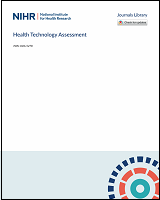NCBI Bookshelf. A service of the National Library of Medicine, National Institutes of Health.
Duffy L, Clarke CS, Lewis G, et al. Antidepressant medication to prevent depression relapse in primary care: the ANTLER RCT. Southampton (UK): NIHR Journals Library; 2021 Nov. (Health Technology Assessment, No. 25.69.)

Antidepressant medication to prevent depression relapse in primary care: the ANTLER RCT.
Show detailsAntidepressants are used to treat depression when someone is unwell, but are also used as maintenance treatment to prevent the reoccurrence of depression. There has been a large increase in the use of long-term maintenance antidepressant treatment, but the evidence for the benefits of maintenance beyond 8 months is very poor.
The ANTidepressants to prevent reLapse in dEpRession (ANTLER) trial was a randomised controlled trial that examined the effectiveness of long-term maintenance treatment with antidepressants. The participants were well enough to consider stopping antidepressant medication, were recruited from primary care and had taken antidepressants for ≥ 9 months. In total, 238 participants were randomised to continue taking antidepressants and 240 were randomised to receive a visually identical tablet that contained no active ingredients after a period when the antidepressants were gradually reduced. Neither the participants nor those interviewing them knew which group they had been placed in, and they were followed up for 1 year.
Participants who discontinued antidepressants were more likely to experience relapse than those who continued antidepressants. By 52 weeks, 39% of those who continued antidepressants had experienced a relapse, compared with 56% in the group that discontinued antidepressants. In other words, over a 52-week period, one in every six patients who stopped antidepressants would experience a relapse that may not have occurred if they had remained on their antidepressants. Patients in the discontinuation group reported more symptoms of anxiety and depression and experienced more withdrawal symptoms than those in the maintenance group, mostly in the first 3–4 months after stopping the antidepressants. Participants in the discontinuation group also reported lower quality of life than those in the maintenance group but both groups used similar amounts of health-care and social care resources over the 12-month period. About one-third of participants who were allocated to the discontinuation group in the ANTLER trial decided to restart their antidepressants. However, another one-third of participants in that group remained on trial medication for 12 months and managed without antidepressants.
Long-term maintenance treatment with antidepressants is effective in reducing the rate of relapses. For those who are considering stopping their antidepressant, our findings will provide estimates of the likely benefits and harms, to improve shared decision-making and support the regular review of long-term antidepressant prescription.
- Plain English summary - Antidepressant medication to prevent depression relapse ...Plain English summary - Antidepressant medication to prevent depression relapse in primary care: the ANTLER RCT
- Cardamine graeca GE trnL-trnF intergenic spacer, partial sequence; chloroplastCardamine graeca GE trnL-trnF intergenic spacer, partial sequence; chloroplastgi|78098568|gb|DQ209202.1|Nucleotide
Your browsing activity is empty.
Activity recording is turned off.
See more...